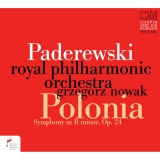 Ignacy Jan Paderewski: Symphonie h-Moll (Polonia), op. 24; Royal Philharmonic Orchestra, Grzegorz Nowak; 1 CD Frederick Chopin Institute NIFCCD065; Liveaufnahme 08/2018, Veröffentlichung 10/01/2020 (65') - Rezension von Remy Franck
Ignacy Jan Paderewski: Symphonie h-Moll (Polonia), op. 24; Royal Philharmonic Orchestra, Grzegorz Nowak; 1 CD Frederick Chopin Institute NIFCCD065; Liveaufnahme 08/2018, Veröffentlichung 10/01/2020 (65') - Rezension von Remy Franck
Die Symphonie Polonia komponierte Ignacy Jan Paderewski zwischen 1903 und 1908. Bis zu seinem Tod im Jahre 1941 war sie Paderewskis vorletzte Komposition. Das Komponieren gab der Pole zugunsten einer politische Karriere auf, die ihn auf den Posten des ersten Ministerpräsidenten der unabhängigen Republik Polen führte.
Die vom Boston Symphony Orchestra 1909 uraufgeführte Symphonie
besteht aus drei Sätzen, einem Adagio maestoso – Allegro vivace (Die glorreichen Tage Polens in der Vergangenheit), einem Andante con moto (Polen der Gegenwart) und einem Vivace (Aufbruch in eine glücklichere Zukunft).
Gregorz Novak dirigiert das einleitende Adagio maestoso sehr besinnlich, um dann das Allegro vivace rastlos dramatisch zu gestalten. Das Royal Philharmonic musiziert schwungvoll und mit voller Kraft. Eine fieberhafte, mitreißende Interpretation!
Das Andante con moto beginnt düster und wird dann elegischer, steigert sich dramatisch und endet besinnlich.
Das Finale enthält eine verkappte Bearbeitung der ersten beiden Takte der polnischen Nationalhymne, aber der Grundcharakter ist dramatisch und dynamisch: es ist ein Kampf gegen die Mächte, die Polen in Gefahr bringen könnten. Zwei ruhigere Passagen gibt es in diesem durchwegs fulminanten Satz, den Nowak mit überschwänglich-drängender Geste dirigiert.
Die spätromantische, mitunter an Elgar, Rachmaninov und im dritten Satz vor allem auch an Wagner und an Tchaikovskys Manfred erinnernde Symphonie wird also auf dieser CD in einer exzellenten Interpretation vorgelegt, die hoffentlich helfen wird, das opulente Werk bekannter werden zu lassen.
Ignacy Jan Paderewski composed his Symphony Polonia between 1903 and 1908, and it was his penultimate composition until his death in 1941. The Pole gave up composing in favour of a political career that led him to the post of the first Prime Minister of the independent Republic of Poland.
Premiered by the Boston Symphony Orchestra in 1909, the symphony consists of three movements, an Adagio maestoso – Allegro vivace (Poland’s glorious days in the past), an Andante con moto (Poland of present times) and a Vivace (departure for a happier future).
Gregorz Novak’s interpretation is beginning with a contemplative Adagio maestoso, followed by a highly dramatic Allegro vivace. The Royal Philharmonic’s playing is opulent and dynamic. A feverish, rousing performance!
The Andante con moto begins darkly and then becomes more elegiac, increases dramatically and ends contemplatively.
The finale contains a disguised arrangement of the first two bars of the Polish national anthem, but the basic character is dramatic and energetic: it is a fight against the powers that could endanger Poland. There are two quieter passages in this thoroughly brilliant movement, which Nowak conducts with an exuberant, urgent gesture.
The late-Romantic symphony, sometimes reminiscent of Elgar, Rachmaninov and, in the third movement above all of Wagner and Tchaikovsky’s Manfred, is thus presented on this CD in an excellent interpretation which will hopefully help to make this opulent work better known.
























